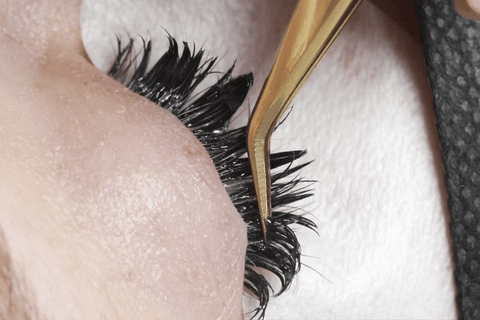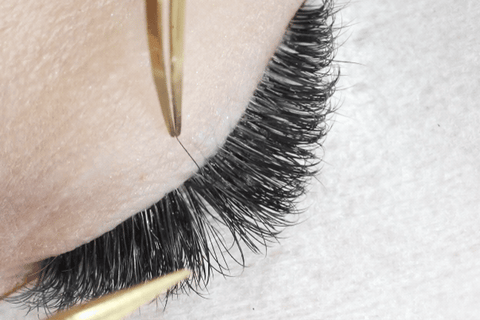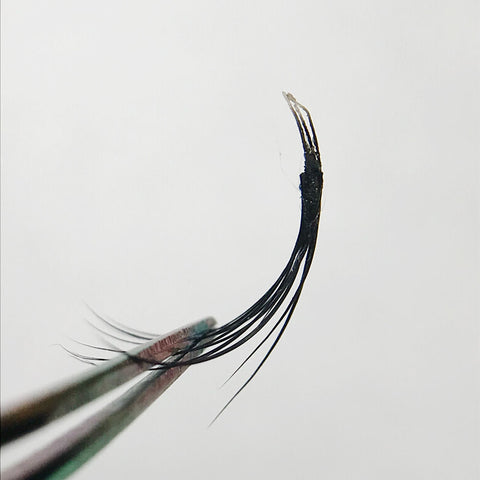FREE STANDARD SHIPPING FOR ORDERS OVER $170!
FREE STANDARD SHIPPING FOR ORDERS OVER $170!
Glues & Liquids
Ebooks

4 Reasons Your Clients Might Ask for A Lash Removal
October 01, 2023 6 min read
Eyelash Extension Removal: The Four Main Reasons You Might Be Reaching for the Remover
Eyelash extensions have become a staple for so many of us and our clients for the simple reasons that they save us time getting ready and generally boost our confidence – who doesn’t love an ‘I woke up like this’ moment? There are times however, when these extensions may need to be removed for any number of reasons, be it the client wanting a new style, deciding that lashes aren’t really for them any more, or due to the dreaded allergic reaction.
Here are the four main reasons you'll be removing lash extensions, and some tips about the best methods to pick for each.
Client Request
Sometimes, clients may simply decide that they no longer want their extensions – who among us doesn’t change their mind at every available opportunity? If your client came to you for lashes for a special event, it’s quite common for them to come back to change their style – usually to something more subtle after having had bold lashes for their event – or just to remove the lashes entirely, as they’re more of an occasional treat for them.
Another reason your client might want their lashes removed is because they would like a change of style – maybe there’s a new trending lash mapping style that they want to try, or maybe they’re changing from a lash trend to something more conventional. Either way, when it’s a complete style change, a complete removal is usually necessary.
Your client may want their lashes removed for any number of reasons, but it’s really important that they know they need to come to you to have them removed safely – the only way to remove lash extensions whilst guaranteeing lash and eye safety is to have them removed by a professional who knows exactly what they’re doing.

Allergic Reaction
Allergic reactions to eyelash extensions glue can happen – they’re not common and due to them being an accumulative allergy, they tend to creep up on you when you least expect it! If your client has an allergic reaction to the lash glue, suggest that they visit their doctor or a pharmacy to see if there is any medication that they could take to reduce the effects of the reaction first and foremost.
Depending on the severity of the allergic reaction to lash extensions, it might be worth waiting a couple of days to remove the lashes, if that’s the course of action you decide to take. This is for the simple reason that you need to be able to access the glue bonds in order to remove the lashes, as the remover needs to be able to break down the lash glue. If the eyelids are too swollen then you won’t be able to access the glue bonds safely.
Something else to keep in mind if you’re removing lashes due to an allergic reaction is that skin of the reactive area is likely to be emitting more heat, so it’s extremely important that you do not use gel removers, but opt instead for a cream lash remover which won’t become runnier due to the increased heat and make its way into your client’s eyes. Again, it needs to be made clear to the client that they should not attempt to remove the lashes themselves as this can lead to all sorts of other problems, the least of which is discomfort.
Maintenance and Lash Fills
Lash extensions have a natural lifespan that is dependent on the hair’s growth cycle. Over time, as some extensions shed with the natural lashes, the set can start to look sparse. While it's not necessary to remove the remaining extensions to freshen up a lash look, you should be removing the lashes that have grown out a lot in order to replace them with new extensions. We do this for two reasons.
Firstly, we do it because a lash set looks better when all of the extensions are applied at more or less the same distance from the eyelid – that’s around 0.5mm, generally speaking, but don’t get too hung up on that, it comes with practice and it’s better to apply your lashes a little too far away from the eyelid than to have them touching the eyelid. Even with wispy lashes, you want to play around with the lengths you’re using and not the distance lashes are applied from the eyelid. This is largely due to the second reason that we remove these extensions…
The other reason that we remove grown out lashes is because we want to keep them safe and healthy. By leaving these lashes on the grown out natural lash, we’re leaving the extra weight of the extension closer to the tip, which can lead to damage even if we’re using lashes which would otherwise be a safe thickness and length. If you’d like to know more about the ways that lash extensions can damage natural lashes, take a look at this blog post.

When we remove grown out lashes during a lash fill, we don’t need to remove all of the lashes, and we of course want to be quick without making a mess – one option is to take some gel remover on a microfiber brush and apply it to individual lashes, but this does take a little time, and if the lashes move back together, you run the risk of if breaking down the glue bonds on either side of the one you’re trying to remove. A faster method – though one we encourage you to practice on a training mannequin just to make sure you really get to grips with it – is the banana peel method of lash removal.
The banana peel method is where you remove lashes in a peeling motion. It’s clean, it’s fast, and though it looks like a harsh method, the lashes will actually be completely fine afterwards. So, how do you do it?
- Isolate the lash you want to remove the extension from
- With your isolation tweezers, grip the natural lash as close to the glue bond as possible
- With your application tweezers, grip the extension and pull it towards you, gently peeling it off of the lash.
- If you’re removing fans, the whole fan should come off in one go, but sometimes they will want to come off lash by lash – this is still a faster method than using remover!

Writer’s note: If you’re worried about the banana peel method being uncomfortable for your clients, I’m happy to report that they will barely feel it! I had around 50% coverage left once, and had my lashes removed rather than filled (yes, I regretted it almost immediately). My Lash Tech at the time removed them using the banana peel method because she wanted to really test it out and, well, when you work in an office with Lash Techs, you become each other's guinea pigs! All I really felt was a little bit of a popping sensation, but all in all it was pretty relaxing. Just be sure to explain to your client what you’re doing, because I imagine it might feel a bit like your lashes are being cut if you didn’t actually know what was going on!
Incorrect Application
Throughout your career, you may have an occasional client come to you with poorly applied lashes. By this, we don’t mean aesthetically bad, we mean in terms of them being unsafe. Lashes with too much glue which are laden with stickies, or using extensions that are too heavy being the main culprits of the damage. In this case, it’s really important to remove the lashes, but be very patient with them – if there is a lot of glue you may have to apply some remover, let it do what it can, then apply some more to really get rid of the glue there.

TIP: Don’t attempt the banana peel method on lashes which have too much glue on them – you’ll need to really let the remover work its magic to soften the glue before you even attempt to swipe the lashes off!
Whatever the reason for lash removal, you’ll need to be sure you’re doing it with the client’s lash safety in mind – not working properly with lash extensions remover can cause untold damage, not only to the lashes, but to the client’s eyes too. Be sure to educate your clients on the importance of coming to you or a qualified Lash Technician to have their lashes removed – a quick at home lash removal is not going to be worth losing their lashes forever, or even losing their vision if things go really wrong!
Subscribe
Sign up to get the latest on sales, new releases and more …
























